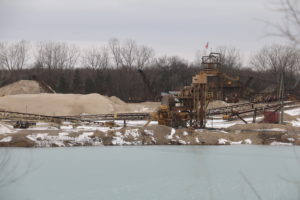By David Fleet
Editor
Groveland Twp.-The dust has been kicked up over proposed statewide legislation that would prohibit local ordinances banning mining if certain criteria were met. In August 2019, Mich. Sen. Adam Hollier-(D-Detroit, District 2) introduced Senate Bill 431 backed by the gravel industry, that would remove most of the jurisdiction of local government to deny permits to land owners for gravel mining operations.
The bill, currently in the Senate Committee on Transportation and Infrastructure would amend the Michigan Zoning Enabling Act and would prohibit local governments, like Groveland Township, from refusing permits to gravel mines, as long as the resources available on the site are valuable and unless “very serious consequences” would result from their extraction.
The bill outlines certain limitations on a local unit of government’s regulation of a mining operation.
Bob DePalma, township supervisor said the rights of municipalities that are home to gravel mining sites are at risk.
“This law takes away … the control that I believe we need,” DePalma said on Wednesday during testimony to the senate committee in Lansing.
He said day-to-day operations issues can generally be dealt with on the local level, although it can become more difficult in cases such as a company pursuing a major expansion of operations.
“We’re going to have practically no control … at all,” he said.
Currently, there are five active mines in Groveland Township, one on the Holly-Groveland township boarder and one in nearby Springfield Township.
“We have potential for new mines too,” said DePalma. “It’s a burden on secondary roads, the empty gravel trains ramble all the time. Many use independent truckers who are often sitting along the road with the diesel engines running. I understand they make money on the number of loads of product they haul out of the gravel pit but it’s at the expense of the community. It’s very hard on the infrastructure especially the roads. When they start hauling early in the morning, I hear about from the neighbors. If anything we need more control not less.”
DePalma also said it’s difficult to create a township master plan when there’s a mining operation in the middle of the area.
“What do you do with a 70 foot deep hole in the ground when the mining is done?” he said.
Supporters of the bill say legislation ensures that Michigan’s infrastructure builders can fully access the states naturally abundant supply of construction-grade aggregates through increased sand and gravel mining closer to major construction zones. Aggregates are the building blocks of the concrete and asphalt needed to rebuild our state’s roads, bridges, sewers and other infrastructure.
Doug Needham, is the president of the Michigan Aggregates Association. The aggregate industry directly employs over 8,000 people in the state.
“With tight supplies driving up costs and long-distance transit costs devouring road funds before a project even starts, it is no wonder Michigan residents are fed up with the status quo roads situation,” wrote Needham, to the Operating Engineers 324 in August.
“Michigan taxpayers are right to ask, ‘Where in the heck is my money going?’
“Sen. Hollier’s plan is the perfect answer to that frustration. It fixes more roads without asking for a tax increase and does so by ending wasteful government spending. This is the type of solution Michigan needs to help solve our road crisis.”
The Michigan Townships Association representing about 1,200 townships statewide urged opposition to the bill.
MTA Executive Director Neil Sheridan and former Groveland Township resident attended the meeting in Lansing on Jan. 29.
“This immensely harmful legislation seeks to eliminate any local say over sand and gravel mining operations-silencing elected leaders and residents’ voices over what happens in their communities and where,” he said.
Senate Bill 431 would next to go the full senate for consideration.
